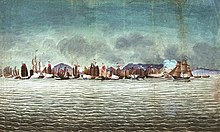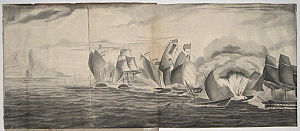Battle of Chuenpi (1839)
穿鼻 之 戰 (1839)
| date | November 3, 1839 |
|---|---|
| place | Humen , China |
| output | Tie, tactical British victory |
| Parties to the conflict | |
|---|---|
| Commander | |
| Troop strength | |
| 1 frigate 1 sloop |
16 junks 13 Brander |
| losses | |
|
1 wounded |
15 dead |
At the Battle of Chuenpi ( Chinese 穿鼻 之 戰 / 穿鼻 之 战 , Pinyin Chuānbí zhī zhàn ) there was a sea battle between British and Chinese naval forces in the Pearl River estuary on November 3, 1839 . Both sides declared themselves victorious. The British ships then withdrew to Macau. The battle was one of the first battles of the First Opium War , with the Battle of Kowloon .
prehistory
The commissioner sent by Emperor Daoguang to suppress the opium trade, Lin Zexu, tried at the end of 1839 to prevent the smuggling of opium from the ships of European traders in Guangzhou . In the course of these measures, he blocked the enclave of the Thirteen Factories . He also decreed that western merchant ships were only allowed to enter the port after a declaration that they would not carry opium with them. In the event of disregard, Lin offered the prospect of destruction of the ships and the death penalty for the crews. British seafarers under the authority of the British superintendent Charles Elliot opened fire on Chinese ships on September 4th at Kowloon after the Chinese refused to go ashore to buy water and provisions , which resulted in a brief naval battle. On September 12th, Chinese soldiers set fire to a Spanish landing craft that they believed was a British boat.
On November 3, 1839, the captain of the British merchant ship Thomas Coutts signed the declaration Lin demanded. However, he was prevented from entering the port by the two British ships HMS Volage and HMS Hyacinth . According to Chinese sources, the battle broke out when the Chinese naval forces tried to prevent the British from preventing another ship, the Royal Saxon , from entering port. According to Elliot, he started fighting after Admiral Guan Tianpei with a flotilla of 29 ships approached him dangerously. According to Elliot, the decisive factor in the attack was a warning from a subordinate captain of a Chinese night attack. Before that, the British asked Guan Tianpei to withdraw with his ships. This acknowledged this with the demand for the surrender of alleged British criminals, which had long been demanded by the Chinese.
course

According to contemporary sources, the British ships were forced to retreat in the course of the naval battle. Elliot reported that the British ships had routed the Chinese flotilla. Persecution made no sense because of her weak strength. In any case, the British ships withdrew to Macau after the battle . Elliot justified this by saying that the city would provide a better base of operations.
consequences
The reports on both sides of losses and damage differ widely. According to Chinese sources, 15 British seafarers were killed and there were many wounded. Lin reported 21 British seamen killed and severe damage to HMS Volage . Elliot reported sunk three junks belonging to the Qing fleet. He reported only a few slightly wounded casualties.
Lin Zexu reported a heroic military victory, but from the Battle of Chuenpi he argued in his correspondence with Daoguang that the British were superior at sea and therefore should not be attacked without the support of land fortifications. Lin assumed at the time that without the backing of the British government, Elliot would have acted aggressively. Daoguang confirmed to Lin that he no longer wanted to allow the British to trade in Canton.
